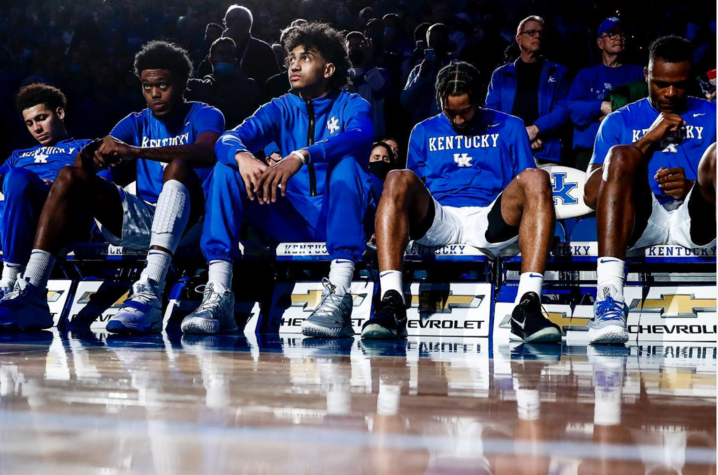Q&A With UK Sport Psychologist Marc Cormier: What it Takes to 'Win it All'
LEXINGTON, Ky. (March 7, 2022) — It’s basketball fans’ favorite time of year — March Madness. Whether it is the love of basketball, or the thrill of competition, every fan is rooting on a favorite team.
What does it take to win it all? Marc Cormier, director of the Sport and Exercise Psychology graduate program housed in the University of Kentucky College of Education Department of Kinesiology and Health Promotion, and director of Counseling and Sport Psychology Services in UK Athletics, recently explained to UKNow how student-athletes handle high-pressure situations.
UKNow: What exactly does a sports psychologist study?
Cormier: Basically, sport psychology professionals study the relationship between psychological/mental factors and optimizing human performance. This can include: focus, emotional regulation, cohesion, motivation, imagery, self-talk and even the psychological aspects of sport injury and rehabilitation.
Elite athletes have strength and conditioning coaches to train the body and athletic trainers to rehabilitate the body and keep it healthy. Sport psychology professionals are another piece of the puzzle as we aim to do each of these for the brain. We may help an athlete through difficulties known as a “slump,” or help them develop the skills to prevent slumps from ever happening. By making athletes aware of the importance of mental factors, we can hopefully help them understand that they have control over the way they think, and therefore, how they perform.
UKNow: From your studies what usually goes through a student-athlete’s head in high-pressure situations?
Cormier: Stress can have a real impact on a person’s performance. Physical symptoms such as muscle tension, sweating, increased heart rate and trembling/shaking may be the difference between a basket and a missed shot. But there are many instances where an athlete looks fine but is experiencing what is called cognitive anxiety (e.g., racing/clouded thoughts, fear of failure, doubt in abilities, poor decision making, etc.). These can be just as detrimental to performance and require different skills to manage.
Every athlete will respond differently to a high-pressure situation. In the end, it all depends on how an athlete appraises the situation. Athlete A may appraise a regular season game at Rupp as “high pressure” because of the crowd noise and bright lights, whereas Athlete B appraises it as no big deal. So, first we must understand the individual athlete and identify what situations lead him/her to thrive and what are potential areas of growth.
What makes the NCAA tournament format so unique are the high stakes, the build-up and importance placed on each game. There are no do-overs. It’s win or go home. So, in addition to student-athletes needing to be physically ready, they need to, somehow, quiet the noise that goes on internally and reduce the negative traffic in their minds. Things like fear of failure, negative self-talk (e.g., don’t miss this shot, don’t lose it for the team) and general self-doubt. Basically, in high-pressure situations, everything is magnified, which can lead athletes to fear mistakes, dwell on mistakes or avoid complex/risky plays altogether.
UKNow: How important is the mental game to performance?
Cormier: The mental game is critical for all athletes, particularly in helping them play to the best of their abilities. What’s important to note here is that mental skills are like any other skill. To some, they come more easily or naturally. To others, it can be more of a challenge and a process. Ultimately, if we think of holistic performance as a pie, a big piece of the whole, particularly at the Division 1 level, will always be physical skill and technical abilities. The rest of the pie is then divided into the other major contributors to performance (e.g., sleep, nutrition, sport IQ, recovery, physical and emotional health and of course, mental skills). As sport psychology professionals, we’re concerned with (a) for each athlete, how big is the piece of pie dedicated to mental skills? and (b) what specific mental skills does an athlete need to work on most? Some athletes need to put in extra reps in building confidence while others need to work on their focus and concentration. The formula looks different for every person, and that, in all honesty, is the most challenging and enjoyable part of my job.
As an aside to this, I don’t want to give off the impression that we’re always looking at things from a deficiency approach. In other words, we’re not always concerned with “what’s missing”. Often, part of the process is identifying things that athletes do well. What are their assets? A good practitioner will help athletes identify strengths and weaknesses, while working to build both.
UKNow: Do you think COVID-19 has had an impact on student-athlete’s mental health and how they handle high-pressure situations?
Cormier: The pandemic has, without a doubt, had an impact on student-athlete mental health. They’re human and not immune to everything we’ve seen and experienced. My colleagues and I have seen an increase in frequency of visits, severity of symptoms and general concern for student-athlete well-being (from coaches and staff). The entire pandemic has been a roller coaster of emotions. Student-athletes had to manage cancelled seasons and championship tournaments, mask mandates, testing protocols, isolation and quarantines, social restrictions, bubbles and modified travel schedules. All of this is in addition to the normal struggles they face and concerns that have plagued us all throughout the pandemic (e.g., health and safety of loved ones, seeing family, satisfying our social needs, etc). At one time or another, we’ve all reached a point in this pandemic (some more frequently than others) where we’ve wanted to shut down the engines for a while. Student-athletes rarely have the luxury to do this. So, in a way, the pandemic has forced people (student-athletes included) to pay attention to how they’re doing and feeling in ways they haven’t before. It’s forced many of us to take stock of what’s important to us and what our needs are. In many cases, student-athletes have reached out for help in managing all of this, but some may still struggle in silence.
As to whether it has impacted the way they handle high-pressure situations, that’s a difficult question to answer. We always consider the environment when optimizing performance. Obviously, the environment is a very broad term since it can involve the physical environment (e.g., stadium, crowd noise, Final Four setting) or socio-emotional environment (e.g., culture, team cohesion, and of course, pandemics). A very basic tool or technique in sport psychology is remembering to “control the controllables.” We need to remember that some things, such as the environment, cannot be changed. Therefore, student-athletes work to control how they respond to uncontrollable events or factors, rather than dwelling on the fact that the environment is not desirable to enhancing their performance. This can be difficult. In essence, we’re asking student-athletes to learn to accept an uncontrollable (living/competing through a global pandemic) while focusing on the aspects of their performance that they can control (e.g., their ability to focus, helping teammates, remaining mindful, their work ethic, etc.).
UKNow: Are there any mental stress coping skills you tell athletes to use that an everyday person could also value from?
Cormier: A lot of what we do in sport is transferable to everyday life because much of what we teach athletes are, in fact, life skills. One major thing I try to do is help athletes focus on the process, not the outcome. It can be counterproductive to be too outcome oriented, because the outcome can be out of our control. Instead, by focusing on the process (i.e., what YOU can do to achieve a desired outcome), we become agents of success. Imagine a person whose goal is to get into medical school. Wanting the outcome can help motivate this person, but ultimately, medical students are chosen from a “best available” approach — meaning, whether or not a person gets in may depend on who else applies that year. But by focusing on the process — controllable things you can do to improve your chances (i.e., completing internships, working hard, submitting a strong assignment) you work harder and simultaneously increase your chances of meeting your outcome by becoming a more desirable candidate. Likewise, in sports, we’re helping an athlete focus on executing the small things (e.g., foot speed, positioning, defensive awareness), to increase baskets and increase the likelihood of winning a game. At the end of the day, I will never try and convince a student-athlete that winning doesn’t matter. Of course, it does. But we can be successful even if we don’t outscore an opponent. This mindset motivates us to keep working, regardless of the outcome.
I also use mindfulness a lot in my work with athletes. There are so many benefits, both on and off the court, to being present. Being in the moment. This means not dwelling on mistakes or thinking too far into the future, but focusing on what you’re doing right now.
UKNow: What sports psychology opportunities are available in the College of Education?
Cormier: Those interested in a career in sport psychology can apply to the graduate program in the Department of Kinesiology and Health Promotion. This is a two-year program and allows students the choice of pursuing an applied or research track. Applied students will complete a 300-hour internship while research students will complete an original thesis project.
Students in both tracks will complete coursework in sport and exercise psychology, group dynamics, counseling techniques, leadership, diversity and inclusion and psychology of injury. More information can be found on our website: https://education.uky.edu/khp/graduate-students/sport-and-exercise-psychology/.
As the state’s flagship, land-grant institution, the University of Kentucky exists to advance the Commonwealth. We do that by preparing the next generation of leaders — placing students at the heart of everything we do — and transforming the lives of Kentuckians through education, research and creative work, service and health care. We pride ourselves on being a catalyst for breakthroughs and a force for healing, a place where ingenuity unfolds. It's all made possible by our people — visionaries, disruptors and pioneers — who make up 200 academic programs, a $476.5 million research and development enterprise and a world-class medical center, all on one campus.






